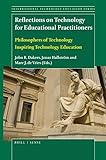Reflections on technology for educational practitioners : philosophers of technology inspiring technology education / edited by John R. Dakers, Jonas Hallström and Marc J. de Vries.
Material type: TextSeries: International technology education studies ; 16.Publisher: Leiden ; Boston : Brill Sense, [2019]Description: xii, 205 pages ; 25 cmContent type:
TextSeries: International technology education studies ; 16.Publisher: Leiden ; Boston : Brill Sense, [2019]Description: xii, 205 pages ; 25 cmContent type: - 9789004405509
- 900440550X
- 9789004405493
- 9004405496
- 601 DAK
- T14 .R44 2019
| Item type | Current library | Call number | Status | Date due | Barcode | |
|---|---|---|---|---|---|---|
| Long Loan | TUS: Midlands, Main Library Athlone General Lending | 601 DAK (Browse shelf(Opens below)) | Available | 224843 |
Includes bibliographical references.
1.Introduction. John R, Dakers, Jonas Hallström amd Marc J. de Vries 2.Carl Mitcham: Descriptions of technology. Johan Svenningsson 3.Peter Kroes and Anthonie Meijers: The dual nature of artefacts 4.Günter Rophol: Supporting a technological literacy for future citizenship. Vicki Compton 5.Pierre Rabardel: Instrumented activity and theory of instrument, Marjolaine Chatoney and Patrick Laisney 6.Gilbert Simondon: On the mode of existence of technical objects in technology education: John R. Dakers 7.Bernard Stiegler: On the origins of the relationship between technology and humans. John R. Dakers 8.Bruno Latour: Actor network theory. John R. Dakers 9.Andrew Feenberg: Implications of critical theory for technology education. Piet J. Ankiewicz 10.Langdon Winner: a call for a critical philosophy. Cecilia Axell 11.Kevin Kelly: Technology education for the technium. David Barlex 12.Don Ihde: Prsxsi philosophies and design and technology education. Steve Keirl 13.Albert Borgmann: the device paradigm 14.Clive Staples Lewis: social, environmental and biomedical implications of technology. Jonas Hallström
"Analyzes the use of philosophy of technology in technology education and unpacks the concept of 'reflective practitioners' (Donald Schön) in the field. Philosophy of technology develops ideas and concepts that are valuable for technology education because they show the basic characteristics of technology that are important if technology education is to present a fair image of what technology is. Each chapter focuses on the oeuvre of one particular philosopher of which a description is given and then insights are offered about technology as developed by that philosopher and how it has been fruitful for technology education in all its aspects: motives for having it in the curriculum, goals for technology education, content of the curriculum, teaching strategies, knowledge types taught, ways of assessing, resources, educational research for technology education, amongst others."--Book cover.
